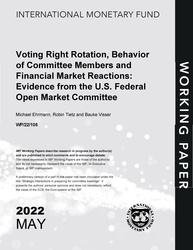
Voting Right Rotation, Behavior of Committee Members and Financial Market Reactions: Evidence from the U.S. Federal Open Market Committee
Voting Right Rotation, Behavior of Committee Members and Financial Market Reactions: Evidence from the U.S. Federal Open Market Committee
READ MORE...
Volume/Issue:
Volume 2022
Issue 105
Publication date: May 2022
ISBN: 9798400210075
$20.00
Add to Cart by clicking price of the language and format you'd like to purchase
Available Languages and Formats
| English |
Prices in red indicate formats that are not yet available but are forthcoming.
Topics covered in this book
This title contains information about the following subjects.
Click on a subject if you would like to see other titles with the same subjects.
Inflation , Labor , Economics- Macroeconomics , Economics / General , voting right rotation , monetary policy committee , central bank communication , FOMC , financial market response , motivation hypothesis , communication behavior , presidents vote , FOMC meeting , Fed president , voting status , Unemployment , Unemployment rate , Inflation , Financial sector , Asset prices
Summary
Which Federal Reserve Bank presidents vote on the U.S. monetary policy committee depends on a mechanical, yearly rotation scheme. Rotation is without exclusion: nonvoting presidents do attend and participate in the meetings of the committee. We test two hypotheses about the dependence of presidents' behavior on voting status. (i) Loss compensation: presidents compensate the loss of the right to vote with an increased use of speeches and contributions. (ii) Motivation: presidents complement the right to vote with an increased use of speeches and contributions. The evidence favors the motivation hypothesis. Also, in years that presidents vote, their speeches move financial markets less than in years they do not vote. We argue that this vote discount is consistent with presidents’ communication behavior.
Copyright © 2010 - 2026
Powered by:
AIDC



